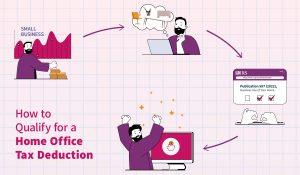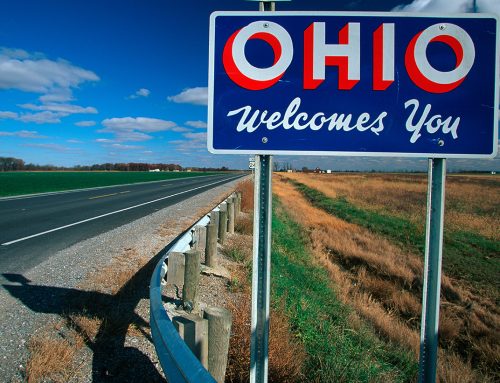
Picture this. An empty coffee mug, or two or three, litter your paper-filled desk. You regularly worry that your pajama pants might somehow be visible in the blurred out backgrounds of video call meetings. Your fridge is your lunchbox and your cat is your coworker. If any or all of these sound like you, you probably work from the comfort of your own home. Congrats! And no, we can’t see those PJs…
But that isn’t the only good news. If you operate a small business and work from home, you might just be eligible for a tax deduction through your home office. Yep, due to your cozy workplace, you might be able to write off things like rent, utilities, maintenance, repairs, insurance, depreciation, and mortgage interest. But of course, you’ll have to forget about write offs for a part of your home unrelated to your business. There goes tax deductible landscaping! Sounds great so far? Well, here comes the big question. Does your small business qualify for a home office tax deduction? Let’s find out.
Who You Are
Ok, so we know you’re working from home. But unfortunately, that doesn’t immediately qualify you for a home office tax deduction. It turns out, you have to be a small business owner or partner. Sorry remote employees! You also can’t just use a part of your home, let’s say, your living room to do some work-related activities like responding to emails and then write it off. You need to actually dedicate a part of your home to your business.
But, for those of you who do run your own business right from your own abode, luckily whether you are renting or own isn’t an issue. Both are fair game. But you’re not off the hook yet, there’s a few more requirements you need to meet to be eligible to claim home offices on taxes.

What Your Home is Like
To the IRS, a home can mean a few things. Of course a house, apartment, or condo. Also a mobile home and even a boat. If you have a shed out back or a separate garage on your property, that works too. Even a studio, greenhouse, or barn. So long as you use it “regularly” and “exclusively” for business purposes. Here’s what doesn’t count: a hotel, motel, or similar entity that is being used in a similar way, even if it is your property.
To qualify for home office tax deductions, you’ll need to meet some additional criteria. You have to use some part of your home exclusively for business and do so on a regular basis. This home also needs to be your “principal place of business” or a place where you perform tasks or duties that you can’t do elsewhere, like management or administrative work. This means you can deduct taxes for a spare room you use frequently as an office. Even if you, let’s say, meet a client for a lunch meeting elsewhere. That is ok, as long as you also use your home regularly.
What Your Business Is
It gets better. What if you use a part of your home for inventory for your small business? If a part of your home is the “sole fixed location” of your business or if you regularly offer daycare services, chances are that you qualify for this tax deduction. Home offices, in these cases, don’t even have to be exclusively used for business. Boo-yah!
But, before you go, there are some additional rules for certain businesses that you need to look out for. Daycare providers, self-employed persons, and farmers need to use special worksheets or forms to claim their deductions. So if that’s you, head to the IRS’s home office deduction page to find out what you need to do.

What You Can Save
I’m sure you’re wondering… How much can this deduction actually help me? Well, let’s take a look at how much money a small business owner, such as yourself, could be saving. One method of calculating your home office tax deduction is called the “Regular Method” and the other is called the “Simplified Option” (seriously, we didn’t make this up). The regular method relies on a determination of actual expenses through records and the percentage of your home used regularly and exclusively for business.
While the regular method is a bit more complicated (hence the additional option), the simplified option gives us a neat guideline to follow. The IRS states that the rule is a “standard $5 per square foot used to determine home business deduction” within the “allowable square footage of home use for business (not to exceed 300 square feet).” This could make out to a pretty sweet deal! Before you calculate yours, there’s a few more rules to know for each method. Take a look at the full range of information available on the calculation options at the IRS webpage here.
What Resources You Have
Still curious? This IRS document (or this webpage) will tell you pretty much everything you ever wanted to know about home office tax deductions and more! Or, if you want to cut to the chase and figure out how to calculate your deduction, visit the IRS’s webpage here.
At weSure, our mission is to make your life easier. We provide the simplest and most intuitive insurance plans for small businesses. If you need a Business Owner’s Policy, or BOP insurance, you’re in luck. The premium is a deductible expense, even if you work at home! Get started with our digital products and services here so we can all start leaving complicated policies in the past. To learn more about our data-driven processes or access more tips for small business owners, visit us at wesuregroup.com and be a part of insurance of the future.
***Disclaimer: weSure is an insurance company. While we are happy to offer suggestions on how you can save, we do not (and are not) giving tax advice. Any tax filing should be reviewed by a certified tax advisor or a CPA.






